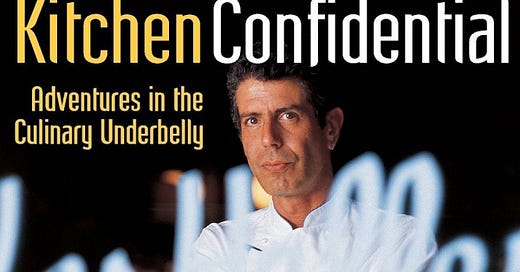In retrospect, the early works of many of my favorite artists, musicians, and writers rarely meet the expectations shaped by their later achievements. Often, encountering these formative projects leaves me bewildered, wondering how, exactly, this person managed to carve out a space in the cultural landscape. When I was twenty, I clung to the comforting belief that “the cream rises to the top.” Now, I’m less convinced. In the age of the algorithm—where cream is more likely an oat-based alternative—success seems less a matter of merit than momentum. Popularity has become both the currency and the catalyst: if something polls well, has an existing following, or manages to slip into the gravitational pull of “trending,” it’s as good as launched.
But then there are exceptions—works that arrive fully formed, unapologetically alive. Anthony Bourdain’s Kitchen Confidential is one of them. It’s an early work that doesn’t just hold up; it feels almost prophetic, a blueprint etched in sharp, hilarious prose. It’s essential reading for anyone who loved Bourdain, has ever worked in a restaurant, or appreciates the kind of writing that feels like it’s being whispered to you from across a battered bar, over a second (or third) round of drinks.
I was so impressed that I was skeptical. It wasn’t until I learned that Bourdain’s father attended Yale and his mother was an editor at The New York Times that the pieces fell into place. In a January 2020 Times article, Daniel E. Slotnik noted that Bourdain’s mother, Gladys Bourdain, played a pivotal role in launching her son’s career, helping him publish his tell-all essay, “Don’t Eat Before Reading This,” in The New Yorker—a piece that sizzled with the swagger and cynicism that would become his signature. Before his breakthrough memoir, Kitchen Confidential, Bourdain attended Vassar (briefly) and wrote two novels, Bone in the Throat and Gone Bamboo, both gritty crime stories laced with the same irreverent charm he later brought to his culinary storytelling.
What makes Kitchen Confidential endure isn’t just the profanity-laced bravado or the insider’s knowledge of French cuisine—it’s the vivid, almost tactile detail, like the way Bourdain described his hands after 25 years on the line: scarred, calloused, burn-mapped, each mark a souvenir from the underbelly of the restaurant world. His voice was magnetic because it was unapologetically raw, a chef’s knife of wit cutting through the pretensions of haute cuisine.
His description of eating sushi in Tokyo—“the most incredible meal of my life”—makes me want to leave my family, move to Japan, and live, really live:
“Each time the chef put another item down in front of us, I detected almost a dare, as if he didn’t expect us to like what he was giving us, as if any time now he’d find something too much for our barbarian tastes and crude, unsophisticated palates. No way. We went on. Calling for more, more. Philippe telling the chef, in halting Japanese, that we were ready for anything he had — we wanted his choice, give us your best shot motherfucker (though I’m sure he phrased it more elegantly). The other customers began to melt away, and our hosts, the chef joined by an assistant now, seemed impressed with our zeal, the blissed-out looks on our faces, our endless capacity for more, more, more.”
Bourdain’s flaw, if you can call it that, was how his story ended. How does a man who had so much—success, family, an audience that adored every rough-edged facet of his persona—choose to take it all away? It’s a question I still can’t answer, and perhaps never will. I don’t know if I can forgive him for the ending. But the beginning? The beginning is still worth every page.




